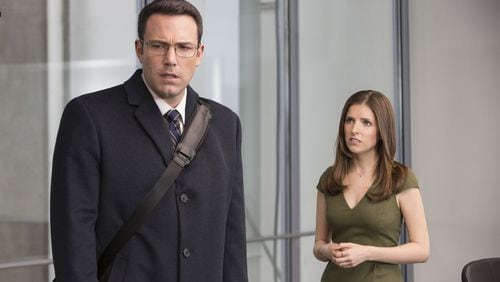Ben Affleck has done a lot. He won an Oscar for co-writing 1997’s “Good Will Hunting” with Matt Damon, directed 2012’s “Argo,” which won the best picture Academy Award, and is one of the most significant actors working today. Recently he has starred in adventurous films such as David Fincher’s “Gone Girl” and Terrence Malick’s “To the Wonder” and created an older, battle-scarred Bruce Wayne in the mass market behemoth “Batman v Superman.”
If his career-spanning path takes him anywhere, it is to explore new directions rather than deliver what Hollywood thinks the public wants. In a recent phone conversation, Affleck said he signed on as the curious, otherworldly, not quite inviting antihero in “The Accountant” because it was a twisty, genre-jumping mystery with an audacious role unlike any he had played.
As Christian Wolff, Affleck’s character is a genius-level math wizard running the books for international criminals and doubling as a hit man. He has Jason Bourne’s survivalist skills and a high-functioning position on the autism spectrum.
“The character was not something I’d ever seen before,” Affleck said. “It was a challenge to play” a reserved, almost expressionless mercenary. “The hard part was that he’s not a very verbal character, and that’s how I express myself. But I thought if you pulled it off right, original and refreshing, it could be the kind of thing that could really surprise audiences.”
He visited institutions focused on autism and spent hours with people it touches, “immersing myself in that world, trying to pick up mannerisms and tics — seeing how being on the spectrum can change your perspective on life.” The research “taught me that it’s very varied. The spectrum is very wide. People’s abilities vary widely. You find as much variation as you would find in any group of people. So I found that there was some leeway, since there’s no single right or wrong.
“I think as a culture we’re recognizing more and more that we’re different from each other, (recognizing) that diversity that we have,” he said. “And hopefully celebrating that. Finding what an asset it is to have so many types of people and culture.”
Affleck also was impressed “that there’s so much humor in that world. I wanted to bring some of that humor to the film. The wit of the people I sat down with, I thought would be something surprising.”
That expanded the dimensions of the original script, which was a hot property on the Black List, the industry’s roster of highly promising unproduced films.
“We were smiling on the set because the character was so likable and fun,” he said. “We expanded on that when we shot the movie, cultivated it. Sometimes a scene or a moment would make me and Gavin (O’Connor, the director) laugh, and we thought, ‘OK, that’s working.’”
The hardest aspect of the movie, Affleck said, were numerous scenes of running, falling and fighting, which he played himself after gaining weight to make Christian appear physically formidable.
“I did a lot of fight rehearsal and stunt play. I’m not wearing a mask here,” as in his ongoing Batman appearances, “so I had to spend a long time trying to get it right and learning these fights, and the choreography, almost like a dance. I worked out every day with these guys to get the technique, which I had not been exposed to before, a part of the job that’s totally different because it’s completely physical.”
Early on, Affleck realized that playing a lethal autistic math whiz could be handing smug comics a tempting target: “This Accountant Crunches More Than Numbers!”
“If you pitch this wrong, it does make it sound like a ‘Saturday Night Live’ skit,” he said. “But that’s the trick with doing something new and different. People aren’t used to it. Hopefully we pulled it off and people down the road will say, ‘You know, it’s kind of like “The Accountant.”’”






